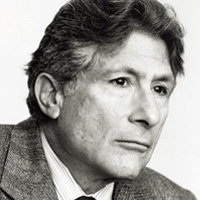The World the Text and the Critic by Edward Said
In the essay 'The World the text, and the Critic', Edward said emphasizes on a form of criticism that is fundamentally oppositional and antithetical to the hegemonic culture. Said argues critic have a responsibility to intervene in the formation of cultures challenging the hegemonic power of culture formation. For that he believes in criticism from the position of marginality.

Edward Said
For Said, all texts are worldly that are involved in particular historical situation. He persistently insists on the worldliness of the text that is related to the social, cultural and economic phenomena. He says" style neutralizes the wordlessness" and makes the critical discourse as world less with an exclusive interest in textuality, and rejects the idea of New Criticism. For him, on contrary to new Critics, a text is something historically and materially more than a critical occasion, it is a social and political monument.
Though said takes a text as a historical and political moment, he denies accepting Bakhtin's dialogic text. He does not regard a text as heteroglossic. Rather he discovers discursive situation in a text that are more like the unequal relations of colonizes, colonizes, and believes that many texts are characterized by “self- confirming will to power.” The self-assumed power of colonizer easily may dominate or suppress other's voices.
In the written discourse to the colonizer imposes his own perspective as in the physical world. This is a proof of the text's being affected by circumstances. In the light of his own thought, Said criticizes Derrida and Foucault for their deconstructive strategies emphasizing on the impartibility of texts. As such their views clearly undermine the intention of the author in placing his text in the world and interfere with the critic's responsibility to challenge the hegemonic power of cultural formations.
Criticism should seek a potential space for alternative acts to overthrow the monopoly of the ruling class. It should be worldly, and oppose monocentrism thereby creating subversive moments that facilitate the emergence of marginal voices. The criticism offered by standing at the marginal is always a true criticism for him.
To conclude, Said offers criticism from marginal standpoint which makes it politically and historically more aware and responsible. In contrast to all totalizing theories like Deconstruction and New Criticism, Said advocates for a self-conscious independent antithetical and oppositional criticism that embrace worldly criticism.
 |
bachelorandmaster.com |